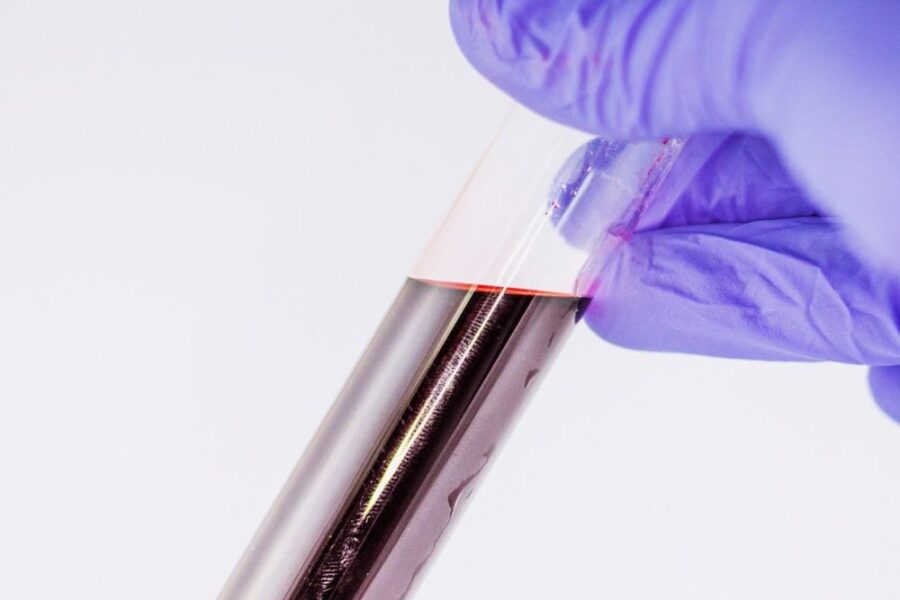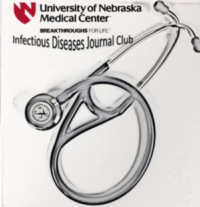Tag: #IDJC
Ongoing Debate on the Treatment of Staphylococcus aureus Bacteremia
Dr. Andre Kalil, our Director of Transplant Infectious Diseases, recently co-authored a reply to Geriak et al.: “Clinical Data on Daptomycin plus Ceftaroline versus Standard of Care Monotherapy in the Treatment of Methicillin-Resistant Staphylococcus aureus Bacteremia.” Debate around the findings of this article was recently featured by Dr. Razan El Ramahi in the IDSA ID […]
Apr 13, 2020
Contraception and Antiretroviral Therapy: Important Interactions to Keep in Mind
Dr. Kimberly Scarsi recently published an important study in Lancet HIV: “Antiretroviral therapy and vaginally administered contraceptive hormones: a three-arm, pharmacokinetic study.” We were excited to learn more about and feature her work! Could you please give us a brief summary of the study you performed? This was a pharmacokinetic evaluation of the effect of […]
Mar 16, 2020
Blood culture contamination–it’s a big deal
Blood cultures are a key diagnostic test to detect bacteremia and appropriately treat patients with sepsis and are performed approximately 30 million times in the United States yearly. Unfortunately, contamination of blood cultures occurs in the 0.5% to 5% of samples (approximately 25% of positive blood cultures are due to contamination) which leads to inappropriate […]
Jan 21, 2020

Decisive De-labelling in Cancer Patients: Just what the Doctor Ordered
The following was previously posted by Dr. Marcelin to SHEA Journal Club published online in January 2019. Although 10% of Americans report penicillin allergies, 90% of those allergies are not substantiated. Up to 25% of patients living with cancer report penicillin allergies, but more than half of these are low risk and could tolerate beta-lactams. […]
Jan 16, 2019

Technology vs. Humans: Role of Rapid Diagnostics and Antimicrobial Stewardship in Cancer Patients
Rapid diagnostic testing (RDTs) plays an important role in Antimicrobial Stewardship Programs (ASP) and highlights the impact of the Microbiology laboratory on reducing inappropriate antibiotic use, particularly in hospitalized patients. Early microbial identification with RDTs can lead to earlier initiation of targeted antimicrobial therapy, which can in turn result in shorter hospitalization, fewer adverse events […]
Jan 3, 2019

Ceftazidime-avibactam resistance in carbapenem-resistant Enterobacteriaceae: what’s next on the horizon?
Ceftazidime-avibactam is approved by the Food & Drug Administration (FDA) for treatment of complicated intra-abdominal and urinary tract infections, and has activity against carbapenem-resistant Enterobacteriaceae (CRE). Data regarding its real-world application and potential pitfalls is still emerging, and this review illustrates some experiences with use and emerging resistance to ceftazidime-avibactam. The authors of the first […]
Aug 15, 2018

ID Journal Club – BLASTing Inappropriate Allergies out of the EMR with Antimicrobial Stewardship
BLASTing Inappropriate Allergies out of the EMR with Antimicrobial Stewardship The following is a review by one of our fellows Dr. Rajendra Karnatak from our last Journal Club, who discussed the article by Leis et al: Point-of-Care β-Lactam Allergy Skin Testing by Antimicrobial Stewardship Programs: A Pragmatic Multicenter Prospective Evaluation, Clinical Infectious Diseases, Volume 65, Issue […]
Jul 19, 2018
Dogma vs. Necessity: Follow-up blood cultures in patients with gram-negative negative bacteremia
Attending on the inpatient Infectious Disease service always stimulates discussion regarding management of bloodstream infections: What is the optimal duration? Can we use oral antibiotics? Do we need to document clearance of blood cultures? When these discussions lead to review of literature, one will find that the data is evolving in an attempt to answer […]
May 23, 2018

ID Journal Club Presents… Molecular Rapid Diagnostic Tests Improve Clinical Outcome
Bloodstream infections are associated with high mortality. Blood cultures are a reliable and accurate method for the identification of bloodstream infections but can take up to 5 days or even more being finalized, leading to delays in initiation of effective antibiotic therapy. The Infectious Disease Society of America (IDSA) recommends the use of rapid diagnostic […]
Mar 19, 2018

Infectious Diseases Journal Club – Should Patients with CAUTI Receive Early Empiric Antibiotics?
On 10/17/2017, Dr. Ashraf discussed an interesting study during UNMC Infectious Diseases Division Journal Club. The study entitled, “Empirical Antibiotic Treatment Does Not Improve Outcomes in Catheter-Associated Urinary Tract Infection: Prospective Cohort Study” was conducted in Israel and published in the Journal Clinical Infectious Diseases in August 2017. In this prospective observational cohort study, the authors studied […]
Nov 8, 2017

Recent Posts
- Strong Representation from UNMC Specialty Care Clinic at International HIV Conference
- World Bronchiectasis Day – Raising Awareness, Inspiring Action
- UNMC Specialty Care Center Co-Hosts Nebraska HIV Prevention and Care Update Conference
- Excitement Builds for SHEA Spring 2025: Meet the Presenters from Our Division
- Nebraska ID Society Trainee Abstract Competition
Archives
- July 2025
- May 2025
- April 2025
- March 2025
- February 2025
- January 2025
- December 2024
- November 2024
- October 2024
- September 2024
- August 2024
- July 2024
- June 2024
- May 2024
- April 2024
- March 2024
- February 2024
- January 2024
- December 2023
- November 2023
- October 2023
- September 2023
- August 2023
- July 2023
- June 2023
- May 2023
- April 2023
- March 2023
- February 2023
- January 2023
- December 2022
- November 2022
- October 2022
- September 2022
- August 2022
- July 2022
- June 2022
- May 2022
- April 2022
- March 2022
- February 2022
- January 2022
- December 2021
- November 2021
- October 2021
- September 2021
- August 2021
- July 2021
- June 2021
- May 2021
- April 2021
- March 2021
- January 2021
- December 2020
- October 2020
- September 2020
- August 2020
- July 2020
- June 2020
- May 2020
- April 2020
- March 2020
- February 2020
- January 2020
- December 2019
- November 2019
- October 2019
- September 2019
- August 2019
- July 2019
- June 2019
- May 2019
- April 2019
- March 2019
- February 2019
- January 2019
- December 2018
- November 2018
- October 2018
- September 2018
- August 2018
- July 2018
- June 2018
- May 2018
- April 2018
- March 2018
- February 2018
- January 2018
- December 2017
- November 2017
- October 2017
- September 2017
- August 2017
- July 2017
- June 2017
- May 2017
- April 2017
- March 2017
- February 2017
Categories
- Antibiotic Awareness Week
- Antimicrobial Stewardship
- Bench to Bedside
- Conferences and Presentations
- COVID-19
- Faculty and Staff
- Faculty Recruitment
- Fun With ID
- Guest blog posts
- HIV
- HIV/AIDS
- ICAP
- ID Grand Rounds Speakers
- ID History
- ID Pharmacy
- IDIG
- IDSA
- In the News
- Infection Prevention and Control
- Journal Club
- Medical Education
- Micro
- Microbe Monday
- NBU
- Nebraska ASAP
- Nebraska ID Society
- Nebraska Medicine ASP
- Oncology ID
- Pediatric ID
- PharmToExamTable
- Publication Alert
- Research
- Transplant ID
- Uncategorized
- UNMC ASP
- UNMC Enhanced Medical Education Track
- UNMC ID Achievements
- UNMC ID Fellowship
- UNMC SCC
- UNMCID GIVES BACK
- Weekly Corona
- Why I Love ID
Recent Comments